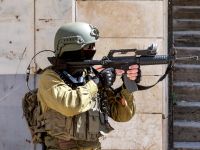In the first indication in years that a missing Israeli airman whose warplane was downed over Lebanon in 1986 may still be alive, an alleged Israeli spy has provided information that Ron Arad was operated on in a hospital, Lebanese court documents showed.
The reference to Israeli navigator Arad came in a charge sheet demanding the death penalty for six Lebanese who are in military custody for allegedly spying for Israel.
Beirut newspapers published the full text of the charge sheet Wednesday.
The charge sheet claimed that one of the alleged spies, Imad Hussein al-Rizz, who worked at the Middle East Hospital in south Beirut, had received information from a doctor at the same hospital that Arad was alive and had been operated on at Al-Ahly Hospital in eastern Lebanon.
According to AP, Al-Rizz also allegedly learned that Arad had been transferred to the nearby Baalbek Hospital. Baalbek is a Hizbullah guerrilla stronghold.
Al-Rizz traveled to Italy in February and passed on the information to an Israeli intelligence contact, receiving $3,000 cash in return, the charges alleged.
It was not clear when Arad was allegedly operated on or transferred or what surgery was performed. But the claims marked the first time in years that specific information has been divulged about the Israeli airman whose plane went down in southern Lebanon in October 1986 when a bomb on his jet went off prematurely. The pilot was rescued, but Arad was captured by Lebanese guerrillas, who reportedly gave him to Iranian agents.
In 1987, Arad's captors issued a picture and letter to his wife, the last sign of life from him.
The leader of the Lebanese Resistance group Hizbullah, Sheikh Hassan Nasrallah, said in the past he had no details on Arad's whereabouts.
The spy ring, which was recently broken up by Lebanese authorities, includes in addition to Al-Rizz: merchant Radwan Hajj along with former bank director Imad Abi Melhem and former Amal official Hassan Hashem.
Also indicted were Raymond Abu Daher, who is believed to reside in Israel, and Hanadi Ramadan, a Lebanese national.
According to the indictment, members of the ring contacted Israeli officers and provided them with political and economic information as well as maps of the positions of Hizbullah and the Lebanese and Syrian armies.
The indictment focused on Hajj’s role in organizing the ring, which was activated at the request of Uri Lubrani, the former coordinator of Israeli activities in southern Lebanon. (Albawaba.com)
© 2002 Al Bawaba (www.albawaba.com)









